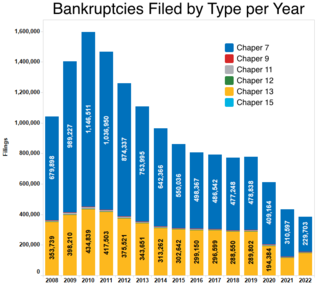Arbitration, in the context of the law of the United States, is a form of alternative dispute resolution. Specifically, arbitration is an alternative to litigation through which the parties to a dispute agree to submit their respective evidence and legal arguments to a neutral third party for resolution. In practice arbitration is generally used as a substitute for litigation, particularly when the judicial process is perceived as too slow, expensive or biased. In some contexts, an arbitrator may be described as an umpire.

In the United States, the Miranda warning is a type of notification customarily given by police to criminal suspects in police custody advising them of their right to silence and, in effect, protection from self-incrimination; that is, their right to refuse to answer questions or provide information to law enforcement or other officials. Named for the U.S. Supreme Court's 1966 decision Miranda v. Arizona, these rights are often referred to as Miranda rights. The purpose of such notification is to preserve the admissibility of their statements made during custodial interrogation in later criminal proceedings. The idea came from law professor Yale Kamisar, who subsequently was dubbed "the father of Miranda."
In law, a judgment, also spelled judgement, is a decision of a court regarding the rights and liabilities of parties in a legal action or proceeding. Judgments also generally provide the court's explanation of why it has chosen to make a particular court order.
Interpleader is a civil procedure device that allows a plaintiff or a defendant to initiate a lawsuit in order to compel two or more other parties to litigate a dispute. An interpleader action originates when the plaintiff holds property on behalf of another, but does not know to whom the property should be transferred. It is often used to resolve disputes arising under insurance contracts.

Foreclosure is a legal process in which a lender attempts to recover the balance of a loan from a borrower who has stopped making payments to the lender by forcing the sale of the asset used as the collateral for the loan.

A debtors' prison is a prison for people who are unable to pay debt. Until the mid-19th century, debtors' prisons were a common way to deal with unpaid debt in Western Europe. Destitute people who were unable to pay a court-ordered judgment would be incarcerated in these prisons until they had worked off their debt via labour or secured outside funds to pay the balance. The product of their labour went towards both the costs of their incarceration and their accrued debt. Increasing access and lenience throughout the history of bankruptcy law have made prison terms for unaggravated indigence obsolete over most of the world.

In the United States, bankruptcy is largely governed by federal law, commonly referred to as the "Bankruptcy Code" ("Code"). The United States Constitution authorizes Congress to enact "uniform Laws on the subject of Bankruptcies throughout the United States". Congress has exercised this authority several times since 1801, including through adoption of the Bankruptcy Reform Act of 1978, as amended, codified in Title 11 of the United States Code and the Bankruptcy Abuse Prevention and Consumer Protection Act of 2005 (BAPCPA).

In contract law, a forum selection clause in a contract with a conflict of laws element allows the parties to agree that any disputes relating to that contract will be resolved in a specific forum. They usually operate in conjunction with a choice of law clause which determines the proper law of the relevant contract.

In contract law, an arbitration clause is a clause in a contract that requires the parties to resolve their disputes through an arbitration process. Although such a clause may or may not specify that arbitration occur within a specific jurisdiction, it always binds the parties to a type of resolution outside the courts, and is therefore considered a kind of forum selection clause.

The Bankruptcy and Insolvency Act is one of the statutes that regulates the law on bankruptcy and insolvency in Canada. It governs bankruptcies, consumer and commercial proposals, and receiverships in Canada.
Colorado v. Connelly, 479 U.S. 157 (1986), was a U.S. Supreme Court case that was initiated by Francis Connelly, who insisted that his schizophrenic episode rendered him incompetent, nullifying his waiver of his Miranda rights.

The Fifth Amendment to the United States Constitution creates several constitutional rights, limiting governmental powers focusing on criminal procedures. It was ratified, along with nine other articles, in 1791 as part of the Bill of Rights.
The Federal Rules of Bankruptcy Procedure are a set of rules promulgated by the Supreme Court of the United States under the Rules Enabling Act, directing procedures in the United States bankruptcy courts. They are the bankruptcy law counterpart to the Federal Rules of Civil Procedure.

United Kingdom insolvency law regulates companies in the United Kingdom which are unable to repay their debts. While UK bankruptcy law concerns the rules for natural persons, the term insolvency is generally used for companies formed under the Companies Act 2006. Insolvency means being unable to pay debts. Since the Cork Report of 1982, the modern policy of UK insolvency law has been to attempt to rescue a company that is in difficulty, to minimise losses and fairly distribute the burdens between the community, employees, creditors and other stakeholders that result from enterprise failure. If a company cannot be saved it is liquidated, meaning that the assets are sold off to repay creditors according to their priority. The main sources of law include the Insolvency Act 1986, the Insolvency Rules 1986, the Company Directors Disqualification Act 1986, the Employment Rights Act 1996 Part XII, the EU Insolvency Regulation, and case law. Numerous other Acts, statutory instruments and cases relating to labour, banking, property and conflicts of laws also shape the subject.

Commercial insolvency in Canada has options and procedures that are distinct from those available in consumer insolvency proceedings. It is governed by the following statutes:

South African contract law is "essentially a modernized version of the Roman-Dutch law of contract", and is rooted in canon and Roman laws. In the broadest definition, a contract is an agreement two or more parties enter into with the serious intention of creating a legal obligation. Contract law provides a legal framework within which persons can transact business and exchange resources, secure in the knowledge that the law will uphold their agreements and, if necessary, enforce them. The law of contract underpins private enterprise in South Africa and regulates it in the interest of fair dealing.
Civil procedure in South Africa is the formal rules and standards that courts follow in that country when adjudicating civil suits. The legal realm is divided broadly into substantive and procedural law. Substantive law is that law which defines the contents of rights and obligations between legal subjects; procedural law regulates how those rights and obligations are enforced. These rules govern how a lawsuit or case may be commenced, and what kind of service of process is required, along with the types of pleadings or statements of case, motions or applications, and orders allowed in civil cases, the timing and manner of depositions and discovery or disclosure, the conduct of trials, the process for judgment, various available remedies, and how the courts and clerks are to function.
An emoluments attachment order in South African law is a court order whereby the judgment creditor is able to attach part of the salary or wages of the judgment debtor. Once an emoluments attachment order has been granted, the employer of the judgment debtor is obliged to pay a certain portion of the judgment debtor's salary or wages to the judgment creditor.
Law v. Siegel, 571 U.S. 415 (2014), is a ruling of the Supreme Court of the United States that describes the extent of the powers of bankruptcy courts in dealing with the bad faith of debtors.
The anti-deprivation rule is a principle applied by the courts in common law jurisdictions in which, according to Mellish LJ in Re Jeavons, ex parte Mackay, "a person cannot make it a part of his contract that, in the event of bankruptcy, he is then to get some additional advantage which prevents the property being distributed under the bankruptcy laws." Wood VC had earlier observed that "the law is too clearly settled to admit of a shadow of doubt that no person possessed of property can reserve that property to himself until he shall become bankrupt, and then provide that, in the event of his becoming bankrupt, it shall pass to another and not to his creditors."









